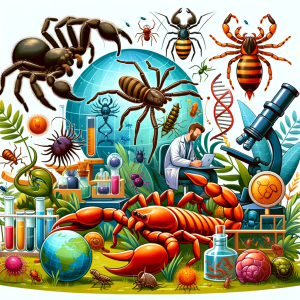
What Amphibians Can Teach Us About the Evolution of Parental Care
Parenting, a behavior observed across various species, is especially intriguing when we look at amphibians. These creatures provide a rich tapestry of behaviors that help us understand the evolution and diversification of parenting in vertebrates. The article, “What Amphibians Can Teach Us About the Evolution of Parental Care”, delves deep into the heart of how and why such diverse parenting strategies have evolved in amphibians.
The Astonishing Diversity of Amphibian Parenting
Amphibians, comprising frogs, salamanders, and caecilians, exhibit a bewildering array of parenting styles. From the male frog carrying eggs in his vocal sacs to the mother caecilian allowing her young to consume her skin for nutrition, each adaptation has a fascinating backstory driven by the need to survive and thrive in varied and often harsh environments. This diversity makes amphibians an ideal group for studying the evolutionary pressures and ecological factors that shape parenting behaviors.
How Did Amphibian Parenting Evolve?
The shift from aquatic to terrestrial living marked a significant evolutionary turn for amphibians. This transition brought about unique challenges, especially in reproduction. Amphibians responded with innovative reproductive strategies, such as laying eggs in moist locations away from open water or carrying eggs on their bodies to protect them from predators and environmental extremes. These strategies are not just about survival; they represent a complex interplay between behavior, physiology, and the environment, illustrating the adaptive nature of parental care.
The Importance of Amphibian Studies in Understanding Parental Evolution
Research into amphibian parental care doesn’t just satiate our curiosity about these fascinating creatures; it provides insights into the broader evolutionary patterns of parenting. By understanding the specific conditions and pressures that led to the diverse parenting strategies in amphibians, we can gain insights into the fundamental principles of evolutionary biology and ecology. This knowledge is crucial not only for understanding the past but also for predicting how species might adapt to future environmental changes.
Challenges and Future Directions
Despite significant advances, much remains unknown about amphibian parental care, particularly among lesser-known species like caecilians. The rapid decline of amphibian populations worldwide underscores the urgent need for more detailed natural history and ecological research. Future research will need to integrate behavioral, physiological, and environmental data to provide a more comprehensive understanding of how parental care strategies evolve and are maintained.
Embracing the Lessons from Amphibian Parenting
Amphibians offer a window into the complex world of evolutionary biology and ecology. Their diverse and sometimes bizarre parenting strategies are not mere curiosities but vital adaptations that have allowed them to colonize a wide range of environments. By studying these strategies, we can gain invaluable insights into the forces that shape behavior and adaptation across all life forms.
Inspiring Action and Conservation
Understanding amphibian parenting is more than an academic pursuit. It’s a crucial step in conserving these species and their habitats. Amphibians are among the most threatened vertebrates on Earth, with significant portions of the population declining or at risk of extinction. By appreciating the complex interplay of factors that influence amphibian parenting, we can better understand the ecological roles these creatures play and the urgent need to protect them.
The Way Forward
As we continue to uncover the secrets of amphibian parental care, we are reminded of the intricate and interconnected nature of life. Each discovery brings us closer to understanding the delicate balance of ecosystems and the remarkable adaptability of life. So let’s dive deeper into the world of amphibians and let these fascinating creatures teach us more about the evolution of life on Earth.
Nurture Your Scientific Curiosity:
Feed your curiosity with ‘This Week in Science’! Our newsletter is a weekly feast of the latest scientific research and inspiring discoveries, perfectly seasoned for educators and avid learners. By subscribing, you tap into a rich source of knowledge that enhances your teaching and learning journey. There’s no charge to subscribe – just a world of science waiting to be explored. Start your journey today toward a more enriching and active engagement with the wonders of science.



